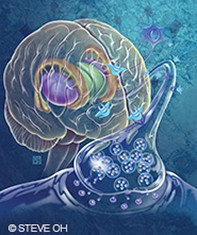Peer Reviewed
Feature Article Neurology
The clinical challenge of early Parkinson’s disease
Abstract
Early Parkinson’s disease may be challenging to diagnose because of its potentially subtle symptoms, such as REM sleep behaviour disorder, and similarity to differential diagnoses including dystonic tremor and ‘Parkinson-plus’ conditions. Nevertheless, early diagnosis allows symptomatic relief and prognostication, which is crucial for many patients.
Key Points
- The prevalence of Parkinson’s disease (PD) is expected to rise by 80% over the next 20 years.
- PD is complex, with marked heterogeneity, making diagnosis and management difficult even for specialists experienced in movement disorders.
- Nonmotor symptoms such as affective disorder, anosmia, constipation and rapid eye movement sleep behaviour disorder can predate the development of motor symptoms by several years.
- Recent evidence suggests that early treatment of patients with PD does not accelerate disease.
- Evidence supports the use of levodopa, dopamine agonists and monoamine oxidase inhibitors.
Picture credit: © Steve Oh.
Purchase the PDF version of this article
Already a subscriber? Login here.

